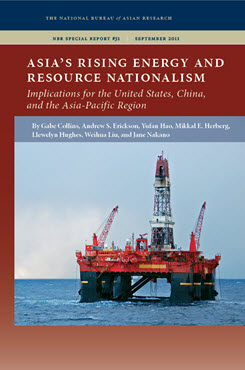Resource Nationalism in the Asia-Pacific
Why Does It Matter?
This essay examines the growing concerns over the rise of resource nationalism in the Asia-Pacific and draws implications for crafting effective policy responses.
EXECUTIVE SUMMARY
This essay examines the growing concerns over the rise of resource nationalism in the Asia-Pacific and draws implications for crafting effective policy responses.
MAIN ARGUMENT
This essay argues that responding effectively to the rise of new powers in energy markets requires carefully identifying the range of risks associated with this change. First, it shows that physical scarcity in the international oil market can be discounted as a risk worthy of policymaker attention. The essay then proposes that important national security externalities remain associated with the rise of new energy consumers. Identifying these and crafting appropriate responses is the most important task facing policymakers and analysts today.
POLICY IMPLICATIONS
- Governments that are interventionist in oil markets also tend to be highly interventionist across the economy more generally. Given this, it may be more appropriate to understand energy policies pursued by these governments through the lens of industrial policy rather than resource nationalism.
- Energy security can be a factor in militarizing territorial disputes, but the risks of escalation are relative to the potential value of reserves in disputed areas. When reserves are small, governments are less likely to be willing to take risks based on energy demands.
- Growing energy demand from the Asia-Pacific’s rising powers implies that producer states have a new set of negotiating partners. This reduces the leverage of the U.S., Japan, South Korea, and others over the governments of producer states.
- Standard-setting initiatives, such as the Extractive Industries Transparency Initiative, could further reduce the potential for negative competition while enabling governments to capture the benefits associated with resource investments.
- Even with the emergence of rising powers in Asia, the U.S. remains a critical regional player that is economically interdependent with several states in the Asia-Pacific. U.S. policymakers should focus on maintaining a regional presence, while keeping up military-to-military contacts with China as a way to avoid strategic miscalculations.


